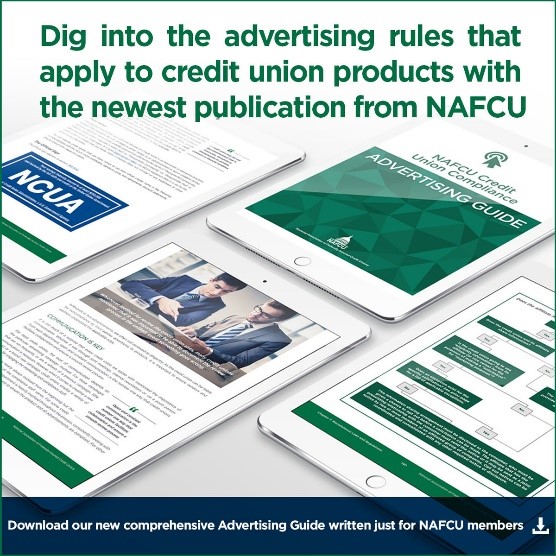Are You Giving Your Members a Bonus?; Advertising Guide Now Available!
Providing a bonus for opening a new share account can be an effective tool for getting new members and increasing deposits. However, NCUA has rules it requires credit unions to follow when they provide bonuses to members. Understanding what NCUA considers a bonus is key to understanding when it is necessary to follow these rules.
NCUA provides its rules for bonuses in its Truth in Savings regulation at Part 707. Section 707.2(e) explains a “bonus” is anything worth more than $10 given or offered to a member “in exchange for opening, maintaining or renewing an account or increasing an account balance.” This can include cash, deposits into an account, gift cards, merchandise or other similar items. The rule goes on to explain that fee waivers or reductions, non-dividend membership benefits and extraordinary dividends are not considered a bonus.
As the rule states the value of what is given must be more than $10 in order to be considered a bonus, the commentary provides additional details on how to determine the value of a potential bonus. The commentary explains the potential bonus must be aggregated per promotion per account per calendar year. For example, suppose that in January, a credit union offers to give members $5 for each calendar quarter during the year where the account balance exceeds $5,000. The offer is a bonus because the member could receive $20 over the course of the year. Whether something is considered a bonus is based on what the member may receive from the promotion, not what the member actually receives.
On the other hand, suppose a credit union offers members $5 to all members who open new savings accounts in January and February. The credit union runs a second promotion in March to provide $10 to all members who maintain an average balance of $10,000 for the month. In this case, neither offer is a bonus even though the same member could receive $5 from the first promotion and $10 from the second promotion. When running multiple promotions in a year, credit unions do not have to aggregate the amounts across all promotions.
The commentary also provides some additional examples and scenarios that are and are not considered bonuses. Based on the commentary, these examples are bonuses:
- When an individual becomes a member and opens a share account, a credit union deposits $25 into the newly opened account.
- At a community event, credit union staff gives a $15 online shopping gift card to each individual who opens an account during the event.
Based on the commentary, these examples are not bonuses:
- A referral program where current members receive $20 if they refer a potential member to the credit union and the potential member actually becomes a member and opens an account. The commentary explains an item given to a third party that is not a joint owner on the account being opened is not a bonus.
- Coffee mugs, T-shirts or other merchandise with a market value of $10 or less per year.
If a credit union determines it is providing bonuses to its members, there are a couple of rules that apply. If a credit union is advertising its bonus, section 707.8(d) requires the credit union to disclose information about the bonus in the advertisement. These disclosures include the time requirements to obtain the bonus, any minimum balance required to obtain the bonus and when the bonus will be provided, among other disclosures. When the account related to the bonus is opened, section 707.4(b)(7) also requires certain disclosures. These disclosures include the amount of the bonus, when it will be provided and any minimum balance and time requirements to obtain the bonus.
Want to learn more about the rules for advertising bonuses and the many other products credit unions offer?
NAFCU’s new member-only Credit Union Compliance Advertising Guide is now available! The guide, designed for both compliance and marketing professionals, covers the federal regulations that apply when advertising your products and services. It also includes strategies credit unions employ to ensure compliance and marketing work efficiently together and tools such as trigger terms tables and media reference charts. For those looking for more on advertising bonuses, see chapter 3 of the guide

